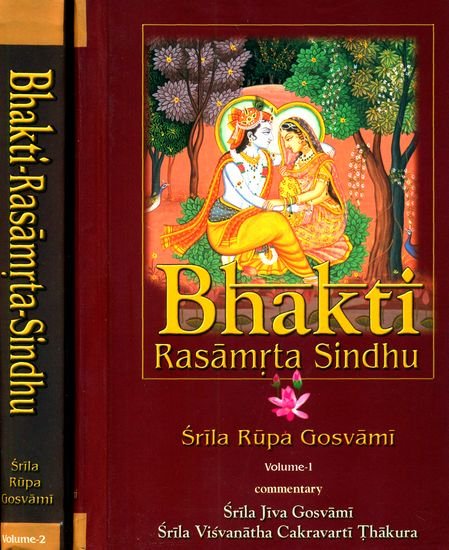Bhakti-rasamrta-sindhu
by Śrīla Rūpa Gosvāmī | 180,912 words
The English translation of the Sri Bhakti-rasamrta-sindhu verse 2.1.316; a medieval era Sanskrit book, written by Rupa Goswami (fl. 15th century) which represents a devotional (bhakti) masterpiece. In this work Goswami describes the nature and different forms of pure love (rasa) as well as various other topics on Vaishnavism and devotion.
Verse 2.1.316
Sanskrit text, Unicode transliteration and English translation:
यथा श्री-दशमे (१०.२१.५) —
बर्हापीडं नट-वर-वपुः कर्णयोः कर्णिकारं
बिभ्रद्-वासः कनक-कपिशं वैजयन्तीं च मालाम् ।
रन्ध्रान् वेणोर् अधर-सुधया पूरयन् गोप-वृन्दैर्
वृन्दारण्यं स्व-पद-रमणं प्राविशद् गीत-कीर्तिः ॥२.१.३१६॥yathā śrī-daśame (10.21.5) —
barhāpīḍaṃ naṭa-vara-vapuḥ karṇayoḥ karṇikāraṃ
bibhrad-vāsaḥ kanaka-kapiśaṃ vaijayantīṃ ca mālām |
randhrān veṇor adhara-sudhayā pūrayan gopa-vṛndair
vṛndāraṇyaṃ sva-pada-ramaṇaṃ prāviśad gīta-kīrtiḥ ||2.1.316||
English translation
An example from the Tenth Canto of Śrīmad-Bhāgavatam [10.21.5]: “Wearing a peacock-feather ornament upon His head, blue karṇikāra flowers on His ears, a yellow garment as brilliant as gold, and the Vaijayantī garland, Lord Kṛṣṇa exhibited His transcendental form as the greatest of dancers as He entered the forest of Vṛndāvana, beautifying it with the marks of His footprints. He filled the holes of His flute with the nectar of His lips, and the cowherd boys sang His glories.”
